Key takeaways:
- Understanding and navigating Italian import regulations requires meticulous attention to documentation, including the Certificate of Origin and Health Certificate, to ensure compliance and product integrity.
- Building relationships with local suppliers and authorities enhances the ability to overcome challenges, such as variable quality standards and regulatory changes.
- Patience and cultural understanding are key; fostering personal connections can lead to better negotiations and smoother processes during importation.
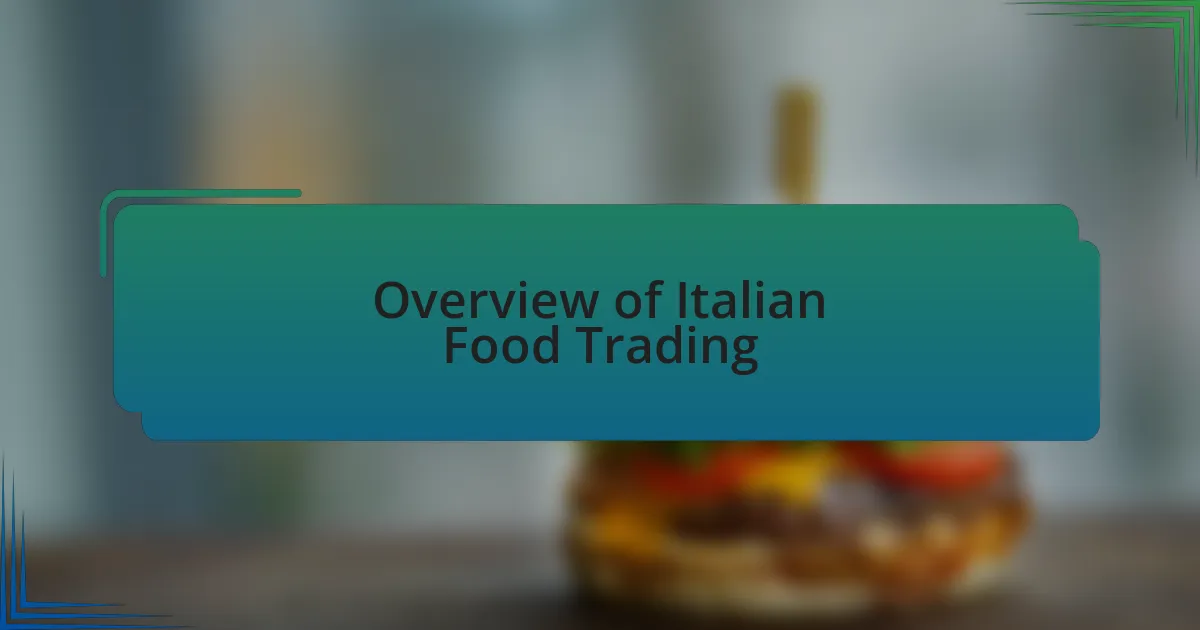
Overview of Italian Food Trading
Italian food trading is a vibrant and multifaceted arena. I remember my first visit to local markets in Florence; the passion and pride that vendors exhibited for their products were infectious. It’s not just about exchanging goods; it’s a celebration of culture, tradition, and the unique flavors that Italy has to offer.
What often strikes me is the balance between regional specialties and international demand. Have you ever tasted real Parmigiano-Reggiano, made in the heart of Emilia-Romagna? The intricate regulations that govern these products stem from a deep-rooted history, ensuring authenticity and quality. This connection between food and its origins adds another layer of appreciation for those of us trading in Italian delicacies.
Moreover, navigating the complexities of Italian food trading demands a nuanced understanding of both the market and the regulations in place. I’ve encountered challenges where local customs and EU laws intersect, prompting me to dive deeper into the rules of the game. It’s rewarding to see how perseverance in understanding these nuances can lead to fruitful partnerships and ensure that the rich heritage of Italian food continues to thrive on a global stage.
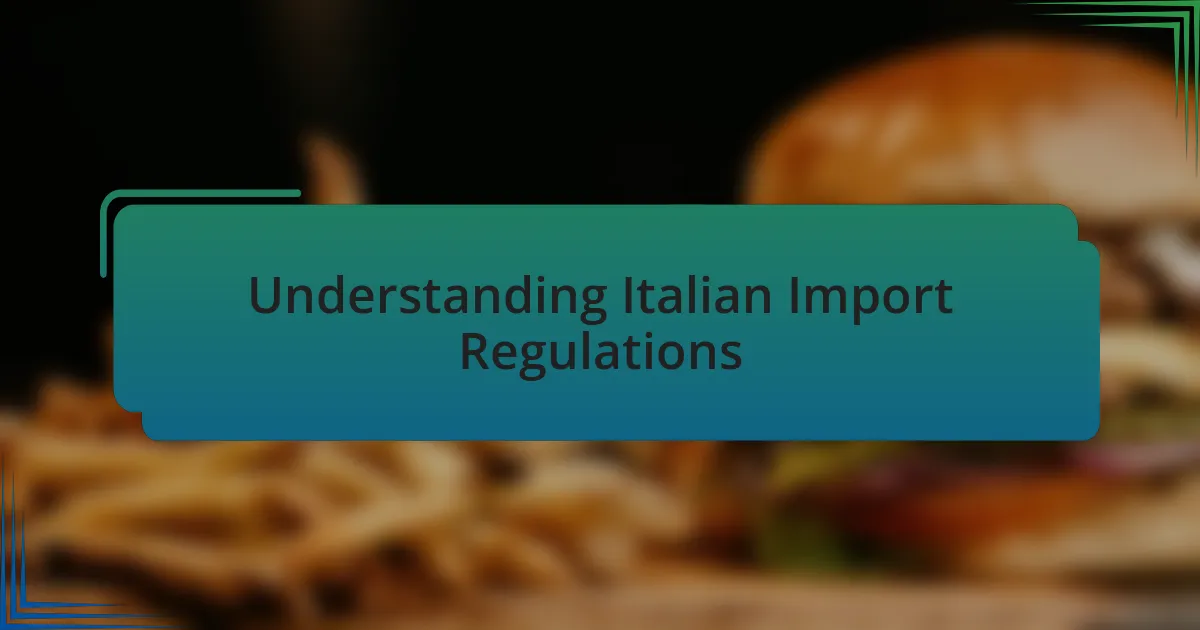
Understanding Italian Import Regulations
Understanding Italian import regulations can feel overwhelming at first. I remember spending hours poring over documents and websites, trying to decipher the nuances of customs requirements and duty rates. Each regulation felt like a puzzle, and unraveling them was essential for ensuring that my imports complied with legal standards, as well as preserving the integrity of the products I sought to share.
Italy’s customs regulations are particularly stringent when it comes to food products, reflecting the country’s commitment to quality. For instance, I once had a shipment of artisanal wines held up due to incorrect labeling. That experience taught me how crucial it is to familiarize myself with regulations regarding product descriptions and certifications. After all, even the smallest oversight can delay or jeopardize an entire shipment.
It’s also important to keep in mind the difference between EU regulations and Italian-specific requirements. I often find myself asking whether I really need to understand both, and the answer is a resounding yes. Each market has its nuances, and it’s my responsibility to navigate these waters carefully. By embracing the complexities and digging deep into the regulations, I’ve not only enhanced my business prospects but also gained a profound respect for the craft of Italian food artisans.
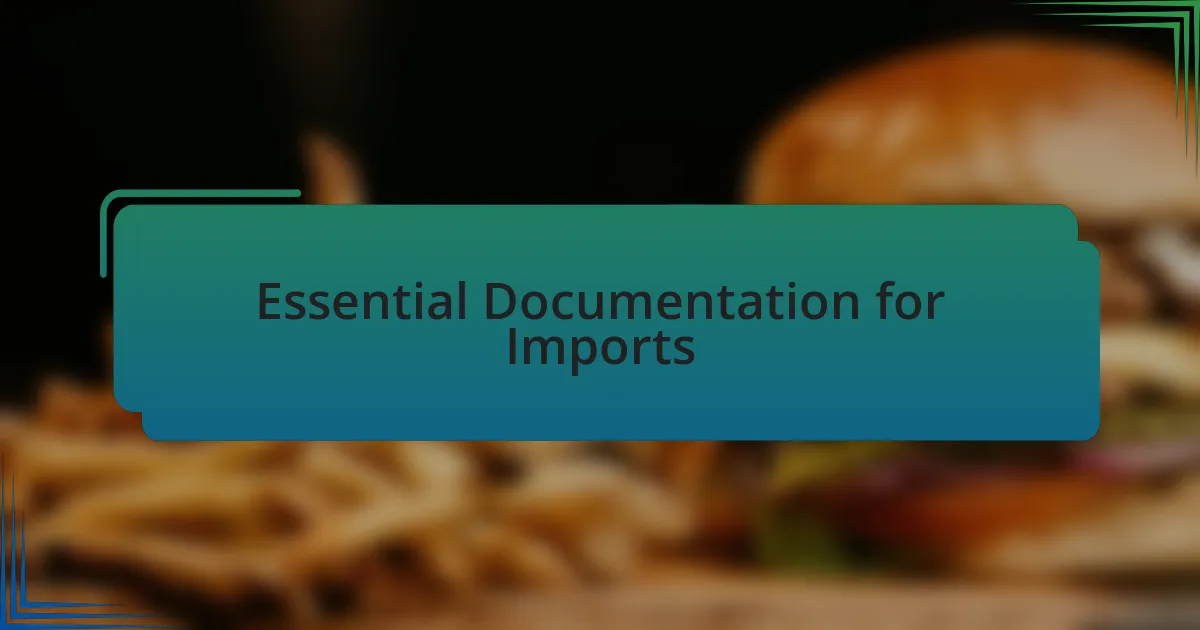
Essential Documentation for Imports
When diving into the essentials of documentation for imports, I’ve learned firsthand the importance of having the right paperwork in order. In my early days of importing, I faced considerable delays because I didn’t submit a Certificate of Origin for a batch of cheeses. That hiccup made me realize how vital this document is; it verifies where the product comes from and is crucial for customs clearance.
Another critical piece of documentation is the Health Certificate. I remember the anxiety of waiting for a shipment of cured meats, knowing that without this certificate, the entire consignment could be rejected. It’s not just about compliance; it’s about ensuring that the products meet Italy’s stringent health standards. In my experience, obtaining this documentation requires coordination between producers and authorities, but it’s worth every effort to maintain product quality.
Customs declarations are also a must-have; they detail the nature, value, and quantity of goods. I often reflect on a particular shipment of olive oil that was held at customs simply because the declaration was incorrectly filled out. That taught me the importance of double-checking every detail. The process may seem tedious, but meticulous attention to documentation can make all the difference between smooth sailing and stressful delays.
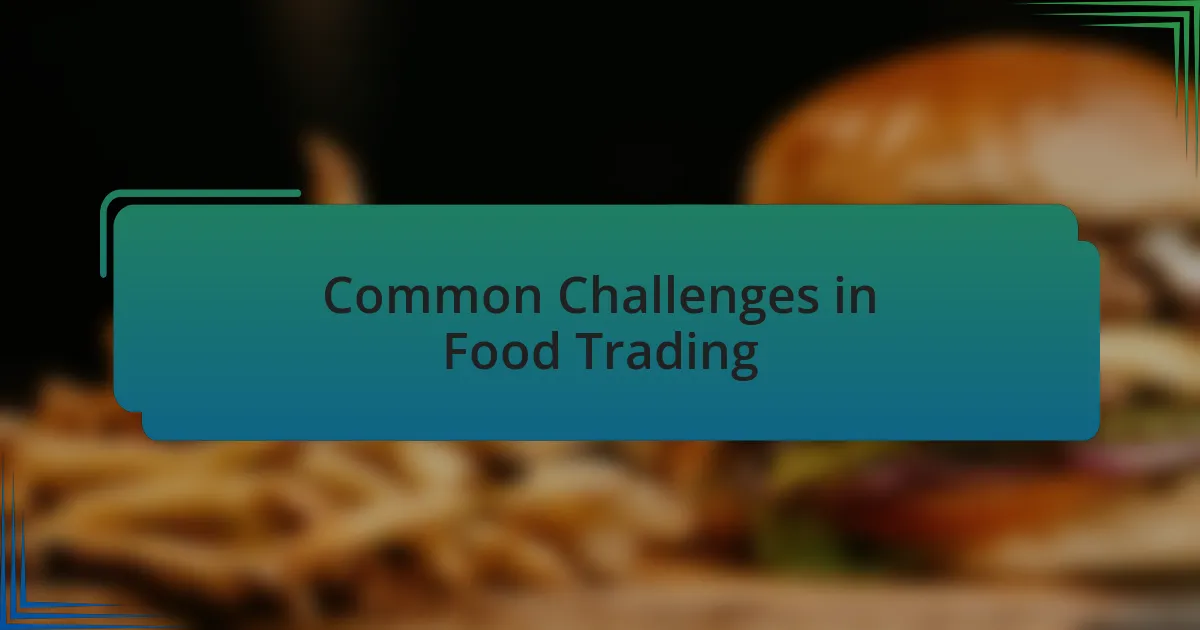
Common Challenges in Food Trading
Navigating the complexities of food trading often brings unexpected hurdles. I recall a time when a shipment of artisan pasta was delayed due to misclassification under tariff codes. This experience revealed how crucial it is to understand not just your products but also how customs interprets them. Have you ever faced a situation where something so simple turned into a monumental challenge? It can really throw your entire timeline into chaos.
Another challenge I encountered was the variability in quality standards across regions within Italy. For instance, when I first imported a selection of Italian cheeses, I was astounded by the differing guidelines for moisture content and aging processes. It felt overwhelming trying to ensure every item met local standards while still appealing to my market. I quickly learned that staying informed and building strong relationships with local suppliers is essential to overcoming this issue.
Lastly, the ever-evolving landscape of regulations can be quite daunting. I remember vividly how a sudden change in packaging laws caught me off guard, jeopardizing the launch of a new product line. It got me thinking—how often do we really stay updated on regulatory shifts? Staying ahead of these changes is not just necessary; it’s critical to maintaining a competitive edge in the Italian food trading market.
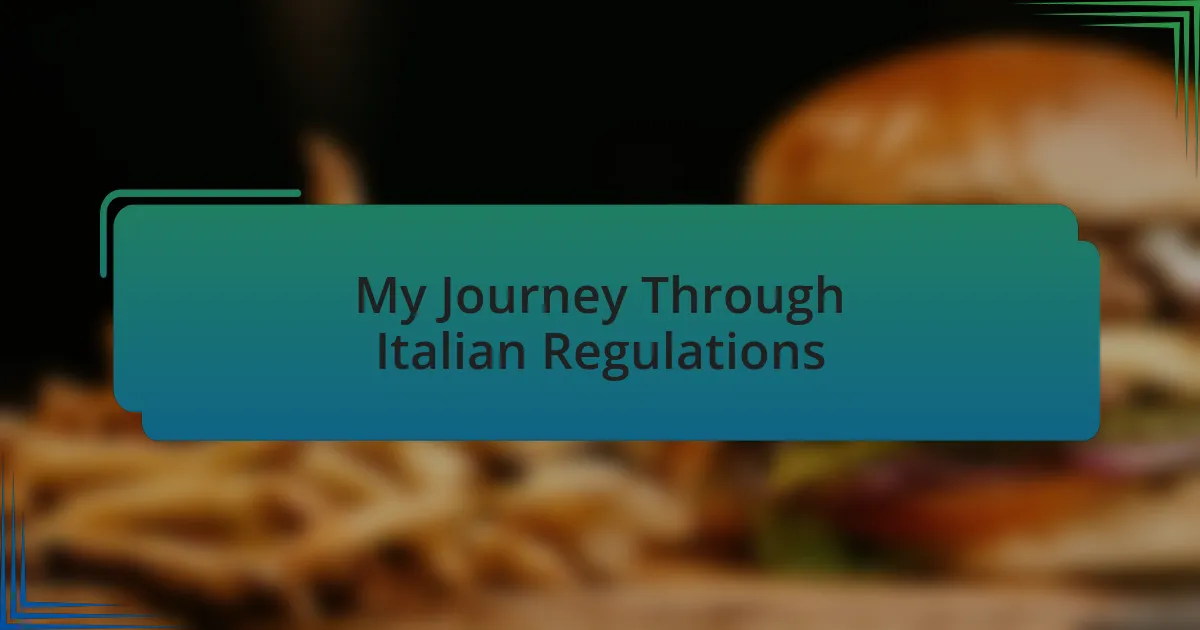
My Journey Through Italian Regulations
My journey through Italian regulations has been a blend of challenges and learning curves that tested my resilience. One particular time, I faced extensive paperwork when trying to comply with food safety standards. I remember feeling overwhelmed with the multitude of forms required, thinking, “Will I ever get it right?” That moment served as my wake-up call to the importance of meticulous documentation—a lesson I carry with me every day.
Another eye-opening experience occurred when I realized that local health regulations varied significantly from one region to another. During a visit to a food expo in Bologna, I was struck by the stark difference in labeling requirements for an olive oil product. It’s maddening, really, when you think you’ve mastered one set of regulations only to discover another that feels entirely foreign. This has taught me that flexibility and adaptability are key traits in navigating such a dynamic regulatory landscape.
As I delved deeper into these regulations, I found that knowledge was both my armor and my weapon. I distinctly remember a negotiation with a supplier who was hesitant to change their packaging to meet new environmental standards. I shared my insights on consumer trends favoring eco-friendly practices, and suddenly, it all made sense to them. Engaging in these discussions not only made compliance easier but also enriched my understanding of the market’s direction. Have you ever had a moment where sharing knowledge opened new doors? That’s exactly what happened to me, sparking both innovation and collaboration.
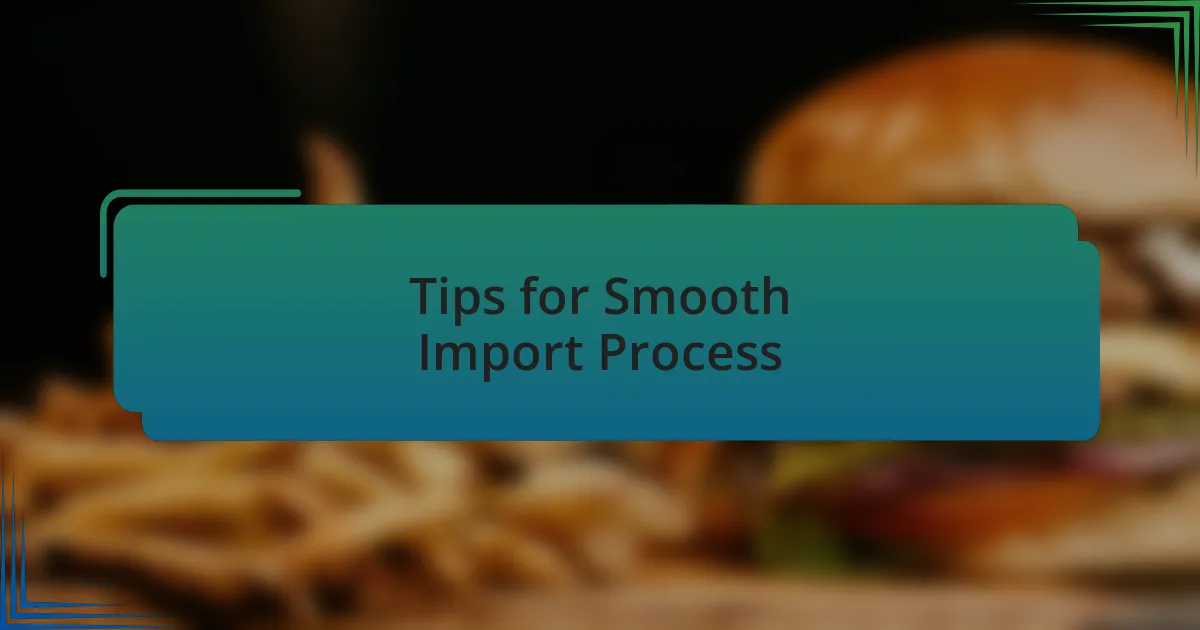
Tips for Smooth Import Process
Understanding the import process can be daunting, but a well-organized approach can make all the difference. One time, I created a comprehensive checklist of all documents required for Italian imports. Having that visual guide kept me focused and relieved some of the stress that came with ensuring everything was in order. Has having a list ever saved you from a last-minute scramble?
Communication is vital for a smooth import process. During one shipment, I maintained a steady dialogue with my freight forwarder. This proactive communication allowed me to address potential issues before they became significant hurdles. I learned that feeling connected with my logistics partner not only eased my anxiety but empowered me to make informed decisions.
Lastly, don’t underestimate the power of building relationships with local authorities. I once attended a workshop hosted by the customs agency that provided valuable insights into new regulations. The connection I made there came in handy when I needed clarification on a complicated rule. Have you ever encountered a situation where knowing the right person made all the difference? That experience has taught me to prioritize networking and learning from those who navigate the same path.

Lessons Learned from My Experience
Navigating Italian import regulations taught me the importance of patience. There was a time when my shipment was delayed due to a minor paperwork issue. I remember feeling frustrated, but it dawned on me that rushing the process only led to mistakes. Have you ever felt the urge to hurry when waiting for something crucial? I learned that taking my time to ensure everything was accurate not only smoothed out the process but also reduced my overall stress.
Another key lesson was the significance of cultural understanding. When meeting with Italian customs officials, I noticed how a little politeness went a long way. I shared stories of my experiences with Italian cuisine, and suddenly, the atmosphere shifted warmly. Have you experienced the difference a personal touch can make? From that point on, I made it a practice to engage on a personal level, which fostered better relationships and even some unexpected flexibility during negotiations.
Finally, I discovered that staying informed is essential. I remember reading about changes to import tariffs that could have impacted my costs. By investing time to stay updated, I was able to adapt my strategies proactively. How often do you take the initiative to learn about changes affecting your business? This experience reinforced my belief in continuous learning—it truly pays off in the long run.